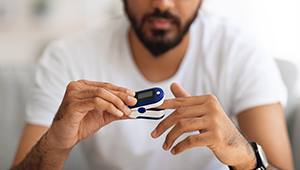January 2025 Dispatch for the CV Team
This month: FDA green lights a generic GLP-1, schools get CPR and AED, nurses aid in AF decision-making, and more.

Every month, Section Editor L.A. McKeown curates a roundup of recent news beyond our regular TCTMD coverage, with tidbits from journals and medical meetings around the globe that are of special interest to heart teams and allied cardiovascular professionals.
The US Food and Drug Administration has approved the first generic liraglutide formulation as an adjunct to diet and exercise in adults and pediatric patients 10 years and older with type 2 diabetes. The generic is a once-daily injectable of the glucagon-like peptide-1 (GLP-1) receptor agonist. In its announcement, the agency said the approval is part of ongoing efforts to increase access to drugs currently in shortage, noting that generics are generally more affordable for patients as well.
Underrepresentation of women as participants and researchers in CV clinical trials remains a problem, asserts a review article published in the American Heart Journal. Among the proposed solutions are mandating that trials can’t end until there is adequate enrollment of women; removing unnecessary exclusion criteria, such as women of childbearing age; implementing telehealth follow-up where possible; arranging transportation without financial penalty; and compensating women who are carers to cover alternative arrangements.
Even the youngest patients treated with TAVR for bicuspid aortic valve disease, despite having lower index in-hospital mortality, experience higher rates of stroke and the composite of stroke, valve reintervention, or death at 5 years compared with those treated with surgery, according to a study of Medicare and Medicaid claims data published in the Annals of Thoracic Surgery.
 A look back at 61,349 emergency department (ED) visits for ACS across Israel between January 2018 and December 2021 gives a glimpse of the impact of the COVID-19 pandemic on care-seeking behaviors. Writing in the International Journal of Epidemiology, researchers say older individuals, particularly women, had the greatest decline in ED visits for ACS, “highlighting the need for tailored public health strategies to maintain public confidence in access to critical care during future health emergencies.”
A look back at 61,349 emergency department (ED) visits for ACS across Israel between January 2018 and December 2021 gives a glimpse of the impact of the COVID-19 pandemic on care-seeking behaviors. Writing in the International Journal of Epidemiology, researchers say older individuals, particularly women, had the greatest decline in ED visits for ACS, “highlighting the need for tailored public health strategies to maintain public confidence in access to critical care during future health emergencies.”
Just before the start of the new year, the bipartisan Cardiomyopathy Health Education, Awareness, Research and Training in Schools (HEARTS) Act was signed into law. It is intended to ensure that students and staff in US schools are prepared to respond to cardiac emergencies by improving resources for cardiopulmonary resuscitation (CPR) and automated external defibrillator (AED) training, and aiding in the purchase of AEDs and related equipment.
 Voluntary guidance released in 2013 resulted in a slight improvement in reporting of participant diversity in skin tone during the investigation phases of FDA-cleared pulse oximeters, according to a study of 510(k) clearance summaries. But, as the researchers report in JAMA, they found “substantial variation in reporting and seeming confusion about concepts of skin tone, race and ethnicity, and national origin.” The FDA hopes to clarify some of those concepts and further improve the inclusion of diverse skin tones in testing, as they outlined in a recent draft guidance document—the public comment period will be open until March 10, 2025
Voluntary guidance released in 2013 resulted in a slight improvement in reporting of participant diversity in skin tone during the investigation phases of FDA-cleared pulse oximeters, according to a study of 510(k) clearance summaries. But, as the researchers report in JAMA, they found “substantial variation in reporting and seeming confusion about concepts of skin tone, race and ethnicity, and national origin.” The FDA hopes to clarify some of those concepts and further improve the inclusion of diverse skin tones in testing, as they outlined in a recent draft guidance document—the public comment period will be open until March 10, 2025
In the ISCHEMIA trial, the severity of disease burden on stress testing was weakly but significantly correlated with the anatomic extent of CAD on coronary computed tomography angiography (CCTA). “In clinical practice, clinicians often order stress testing in an effort to use ischemia severity to stratify patient risk. Our results, combined with earlier studies, demonstrate that CCTA is superior to stress testing for CAD quantification and estimating prognosis,” the investigators write in Circulation: Cardiovascular Interventions.
In the RECOVER III study of patients with acute myocardial infarction with cardiogenic shock (AMICS) undergoing revascularization with Impella (Abiomed) support, researchers found that it is difficult to predict which nonresponders (SCAI Shock stage E) will improve with therapy because they often have similar baseline and admission characteristics as patients who do improve. Writing in JSCAI, the investigators advise that the SCAI Shock classification should be repeated within 24 hours of initiating therapy to more accurately gauge prognosis.
 Patients diagnosed with breast cancer at an advanced stage are 10% more likely than those diagnosed at earlier stages to have preexisting CVD, a Medicare database study suggests. In the paper published in JAMA Network Open, researchers say this finding may be specific to hormone receptor-positive and ERBB2-negative (formerly HER2) disease. They add that confirmatory studies are needed, along with research into interventions to improve patient outcomes, including the use of personalized cancer screening.
Patients diagnosed with breast cancer at an advanced stage are 10% more likely than those diagnosed at earlier stages to have preexisting CVD, a Medicare database study suggests. In the paper published in JAMA Network Open, researchers say this finding may be specific to hormone receptor-positive and ERBB2-negative (formerly HER2) disease. They add that confirmatory studies are needed, along with research into interventions to improve patient outcomes, including the use of personalized cancer screening.
A nurse-led counseling intervention to boost self-management and engagement in decision-making among patients with atrial fibrillation (AF) can improve health-related quality of life, knowledge about AF, adherence to medication, and prescriptions for oral anticoagulants, researchers report in Circulation: Arrhythmia and Electrophysiology. “Our study showed that preparing patients to take an active role in communicating their decision to their physicians was a crucial step to enact the patient-centered care. More specifically, the participants were drilled in assertive communication skills using a scenario-based approach and role-play to facilitate skill consolidation,” they write.
News Highlights From TCTMD:
DRIVE-STEMI Supports Less Restrictive Driving Guidance After Acute MI
Benefits of Various SGLT2 Inhibitors Mostly Consistent in Observational Study
High BP While Lying Down Signals Future CVD Risk
Misleading Statements Common in Online Ads for Compounded GLP-1s
Global Commission Proposes ‘Radical’ Overhaul of Obesity Diagnosis
L.A. McKeown is a Senior Medical Journalist for TCTMD, the Section Editor of CV Team Forum, and Senior Medical…
Read Full Bio


Comments